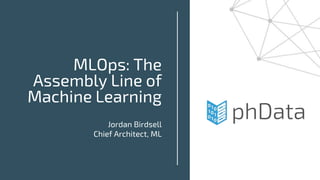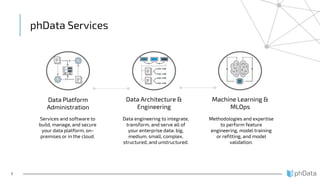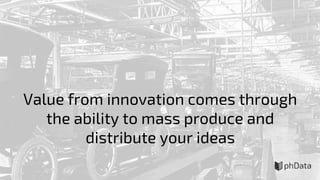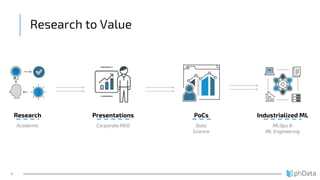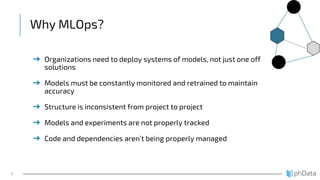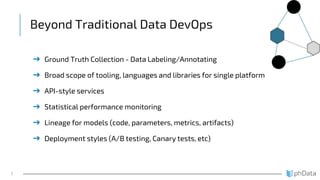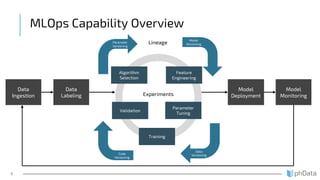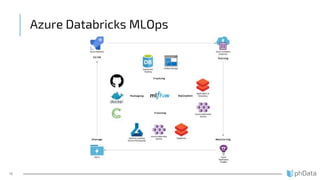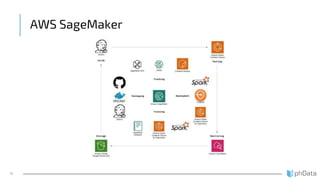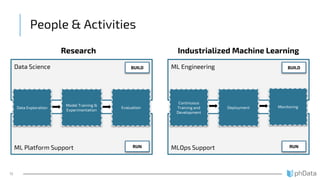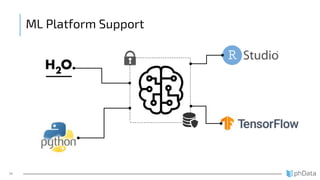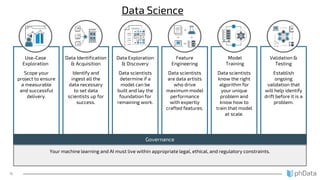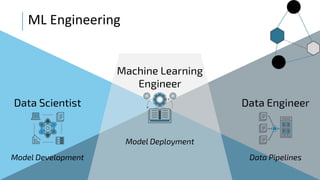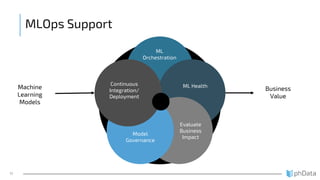MLOps - The Assembly Line of ML
- 1. MLOps: The Assembly Line of Machine Learning Jordan Birdsell Chief Architect, ML
- 2. phData Services 2 Data Platform Administration Data Architecture & Engineering Machine Learning & MLOps Services and software to build, manage, and secure your data platform, on- premises or in the cloud. Data engineering to integrate, transform, and serve all of your enterprise data: big, medium, small, complex, structured, and unstructured. Methodologies and expertise to perform feature engineering, model training or refitting, and model validation.
- 3. It is anticipated that spending on cognitive systems will triple in the next 4 years. Value from innovation comes through the ability to mass produce and distribute your ideas
- 4. Research to Value 4 PresentationsResearch PoCs Industrialized ML Academia Corporate R&D Data Science MLOps & ML Engineering
- 5. Why MLOps? ➔ Organizations need to deploy systems of models, not just one off solutions ➔ Models must be constantly monitored and retrained to maintain accuracy ➔ Structure is inconsistent from project to project ➔ Models and experiments are not properly tracked ➔ Code and dependencies aren’t being properly managed 5
- 7. Beyond Traditional Data DevOps ➔ Ground Truth Collection - Data Labeling/Annotating ➔ Broad scope of tooling, languages and libraries for single platform ➔ API-style services ➔ Statistical performance monitoring ➔ Lineage for models (code, parameters, metrics, artifacts) ➔ Deployment styles (A/B testing, Canary tests, etc) 7
- 11. AWS SageMaker 11
- 13. People & Activities 13 Data Science ML Engineering ML Platform Support MLOps Support Data Exploration Model Training & Experimentation Evaluation Continuous Training and Development Deployment Monitoring Research Industrialized Machine Learning BUILD RUN BUILD RUN
- 15. Use-Case Exploration Data Identification & Acquisition Data Exploration & Discovery Feature Engineering Model Training Validation & Testing Scope your project to ensure a measurable and successful delivery. Identify and ingest all the data necessary to set data scientists up for success. Data scientists determine if a model can be built and lay the foundation for remaining work. Data scientists are data artists who drive maximum model performance with expertly crafted features. Data scientists know the right algorithm for your unique problem and know how to train that model at scale. Establish ongoing validation that will help identify drift before it is a problem. Governance Your machine learning and AI must live within appropriate legal, ethical, and regulatory constraints. Data Science 15
- 16. Data Scientist Machine Learning Engineer Data Engineer ML Engineering Model Development Model Deployment Data Pipelines
- 18. Q&A 18
- 19. phData.io
